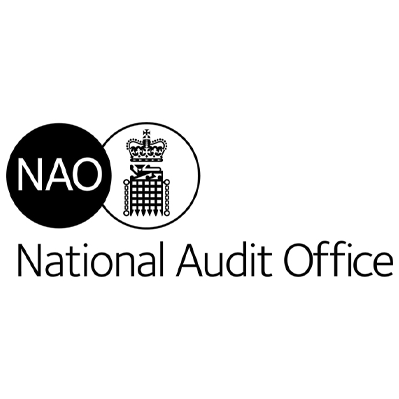Description
National Audit Office (NAO) is an independent Parliamentary body in the United Kingdom which is responsible for auditing central government departments, government agencies and non-departmental public bodies. The NAO also carries out value for money (VFM) audits into the administration of public policy.
Function
The NAO is the auditor of bodies funded directly by the Parliament of the United Kingdom.
The NAO reports to the Comptroller and Auditor General who is an officer of the House of Commons of the Parliament of the United Kingdom and in turn reports to the Public Accounts Commission, a statutory body established under section 2 of the National Audit Act 1983. The reports produced by the NAO are reviewed by the Public Accounts Committee, a select committee of the House of Commons, and in some cases investigated further.
The NAO has two main streams of work: Financial Audits and Value For Money (VFM) audits.
The NAO's financial audits give assurance over three aspects of government expenditure: the truth and fairness of financial statements; the regularity (or statutory validity) of the expenditure, and; the propriety of the audited body's conduct in accordance with parliamentary, statutory and public expectations. Financial audits are carried out in much the same way as private auditing bodies and the NAO voluntarily applies the International Standards on Auditing (ISAs). The NAO is subject to inspection by the Audit Quality Review team of the Financial Reporting Council.
Value for Money (VFM) audits are non-financial audits to measure the effectiveness, economy and efficiency of government spending. Roughly sixty of these reports are produced each year, the most notable from recent years being the reports on MRSA, which led to an increase in public interest in the topic, the report on the rescue of British Energy and the report in the Public Private Partnership to maintain the London Underground. The remits of the NAO and the Public Accounts Committee do not allow them to question the policy itself and so VFM reports only examine the implementation of policy. The responsibility for questioning policy is left for other select committees and debating chambers of Parliament, but this has not prevented the PAC being named committee of the year in 2006.
"Good Governance", an output somewhere between financial and VFM audits, was previously a strand of NAO work, but is no longer a focus of activity. The NAO does, however, publish best practice guidance for public sector organisations. An example includes the fact sheet on governance statements. In addition, the NAO undertakes fast-paced and more narrowly focused work called investigations.
The NAO received new powers under the Local Audit and Accountability Act 2014 to provide an end-to-end view of policy implementation, and produce reports aimed at the local government sector.
The Comptroller Function
The Comptroller Function is administered by the Exchequer Section within the NAO.
Its work centres on recording all transactions to and from the Consolidated and National Loans funds. Money cannot be paid from either of these without the C&AG's prior approval. This approval is granted every banking day through a mechanism known as 'the credit'. The Exchequer Section is also responsible for agreeing payments from the Consolidated Fund directly to certain bodies, including the Queen (through the civil list) and judicial salaries.
Parliamentary links
The NAO produces a number of briefings for select committees, but its key audience is the Public Accounts Committee. It also has a strong relationship with the Public Accounts Commission that oversees the work of the NAO and approves its budgets.
Public Accounts Committee
The NAO and Public Accounts Committee (PAC) form the key links of the Public Audit Circle which has the following sequence:
- The NAO performs financial and VFM audits and makes its reports public
- The PAC has hearings based on NAO reports wherein failures in meeting regularity or propriety requirements are apparent.
- The PAC provides a report with recommendations based on PAC hearings.
- The Government responds to the PAC report in a Treasury Minute.
- The NAO publishes a reply to the minute and there may be an NAO/PAC follow-up study.
Public Accounts Commission
The Public Accounts Commission (TPAC) annually approves the NAO's corporate plans and budgets. It also receives value for money reports on the operation of the NAO. These are written by private sector audit firms in much the same manner as the NAO reports on Central Government.
International Work
The National Audit Office is a member of the International Organisation of Supreme Audit Institutions (INTOSAI). The NAO shares knowledge and experience with other Supreme Audit Institutions (SAIs) around the world and undertakes the audit of some international bodies. For example, between 2010 and 2016 the C&AG was one of three members of the United Nations Board of Auditors, responsible for auditing the United Nations itself, including peacekeeping operations and related organisations such as UNICEF and the UN High Commissioner for Refugees (UNHCR).






















